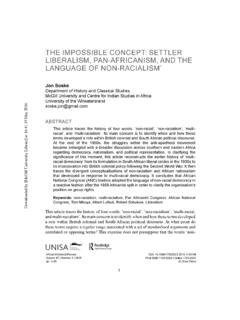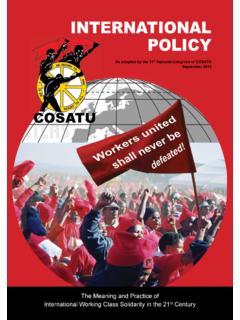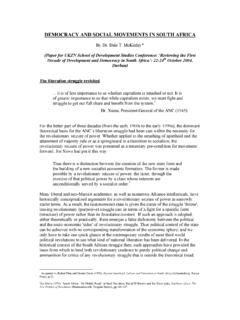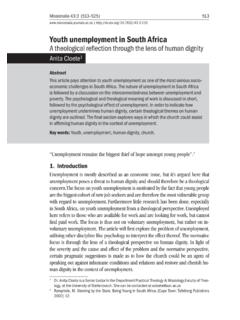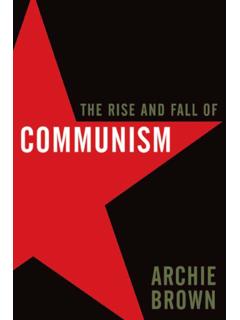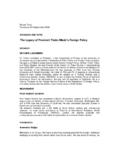Transcription of Patrick Bond - South African History Online
1 Patrick BondElite TransitionFrom Apartheid to Neoliberalism in South AfricaPluto PPressLONDON STERLING, VIRGINIAU niversity of Natal PressPietermaritzburgSouth AfricaFirst published 2000 by Pluto Press345 Archway Road, London N6 5 AAand 22883 Quicksilver Drive, Sterling, VA 20166 2012, USAP ublished in South africa 2000 byUniversity of Natal PressPrivate Bag X01. Scottsville 3209, South AfricaCopyright Patrick bond 2000 The right of Patrick bond to be identified as the author of this work has been asserted by him in accordance with the Copyright, Design and Patents Act 1988 British Library Cataloguing-in-Publication DataA catalogue record for this book is available from the British LibraryISBN 0 7453 1024 9 hbk Pluto editionISBN 0 7453 1023 0 pbk Pluto editionISBN 0 86980 971 7 South African editionLibrary of congress Cataloging in Publication DataBond, transition : from apartheid to neoliberalism in South africa / Patrick bibliographical 0 7453 1024 91. Elite (Social sciences) South africa .
2 2. South africa Economicconditions 1991 3. South africa Politics and government 1994 I. E427 '2'0968 dc2199 048854 Designed and produced for the publisher byChase Production Services, Chadlington, OX7 3 LNTypeset from disk by Stanford DTP Services, NorthamptonPrinted in the EU by TJ International, Padstow Disclaimer: Some images in the original version of this book are not available for inclusion in the eBook. ContentsList of Acronyms and AbbreviationsviIntroduction: Dissecting South africa s Transition1 PART I: POWER AND ECONOMIC DISCOURSES1. Neoliberal Economic Constraints on Liberation152. Social Contract Scenarios53 PART II: THE ASCENDANCY OF NEOLIBERAL SOCIAL POLICY3. Rumours, Dreams and Promises894. The Housing Question122 PART III: INTERNATIONAL LESSONS5. The World Bank as Knowledge Bank (sic)1556. Beyond Neoliberalism? South africa and Global Economic Crisis192 Notes and References253 Index303 List of Acronyms and AbbreviationsABSAA malgamated Banks of South AfricaACAfrican CommunistANCA frican national CongressBEEB lack Economic EmpowermentCansaCampaign Against Neoliberalism in South AfricaCBMC onsultative Business MovementCBOC ommunity-Based OrganisationCIAC entral Intelligence AgencyCoNGO Co-opted Non-Governmental OrganisationCosatu congress of South African Trade UnionsDBSAD evelopment Bank of Southern AfricaDDAD epartment of Development AidDEPD epartment of Economic Planning (ANC)
3 Fabcos Foundation for African Business and Consumer ServicesFMFinancial MailFrelimo Front for the Liberation of MozambiqueGATTG eneral Agreement on Tariffs and TradeGDPG ross Domestic ProductGearGrowth, Employment and RedistributionHIPCH ighly-Indebted Poor CountriesHSRCH uman Sciences Research CouncilHWPH ousing White PaperIDTI ndependent Development TrustIFCI nternational Finance CorporationIFPI nkatha Freedom PartyIMFI nternational Monetary FundIscorIron and Steel CorporationISPI ndustrial Strategy ProjectJCIJ ohannesburg Consolidated InvestmentsJSEJ ohannesburg Stock ExchangeKPConservative PartyLAPCLand and Agricultural Policy CentreLGTAL ocal Government Transition ActLTCMLong-Term Capital ManagementMDCM ovement for Democratic ChangeMDMMass Democratic MovementMergMacroEconomic Research GroupNailNew African Investments LtdNEMN ormative Economic ModelNGDSN ational Growth and Development StrategyNGONon-Governmental OrganisationNHFN ational Housing ForumNISN ational Intelligence ServiceNPNational PartyNumsa national Union of Metalworkers ( South africa )
4 OECDO rganisation for Economic Cooperation andDevelopmentPEPP rofessional Economists PanelPPTP residential Project Team (Umtata)PRPublic RelationsR&DResearch and DevelopmentRDPR econstruction and Development ProgrammeRDSR ural Development StrategySABS outh African BreweriesSACPS outh African Communist PartySADCS outhern African Development CommunitySAHTS outh African Housing TrustSancoSouth African national Civic OrganisationSANDF South African national Defence ForceSangoco South African Non-Governmental OrganisationCoalitionTAUT ransvaal Agricultural UnionTECT ransitional Executive CommitteeTHEMBA There Must Be an Alternative TINA There Is No Alternative LIST OF ACRONYMS AND ABBREVIATIONS/viiUDIU nilateral Declaration of Independence (Rhodesia)UDSU rban Development StrategyUFUrban FoundationUNCTAD United Nations Conference on Trade and DevelopmentUNDPU nited Nations Development ProgrammeWTOW orld Trade Organisationviii/ELITE TRANSITIONI ntroductionDissecting South africa s TransitionThis book aims to fill some gaps in the literature about South africa slate twentieth-century democratisation.
5 There is already anabundance of commentary on the years of liberation struggle andparticularly on the period 1990 94 empiricist accounts, academictomes, self-serving biographies and many more narratives havebeen and are being drafted about the power-sharing arrangementsthat followed the April 1994 election, as well as the record of the ANCin its first of these have been penned by progressives and are generallycritical of the course the transition has taken thus far. In thedevelopment of an extremely rich heritage of thinking and writingabout change in South africa , have the dozen or more seriouscommentaries from the Left missed or skimmed or perhaps de-emphasised anything that this work can augment?I believe so, namely a radical analytic-theoretic frameworkand someof the most telling detailsthat help explain the transition from apopular-nationalist anti-apartheid project to official neoliberalism by which is meant adherence to free market economic principles,bolstered by the narrowest practical definition of democracy (not theradical participatory project many ANC cadre had expected) over anextremely short period of time.
6 It is sometimes remarked that theinexorable journey from a self-reliant, anti-imperialist political-economic philosophy to allegedly home-grown structural adjustmentthat took Zambian, Mozambican/Angolan and Zimbabweannationalists 25, 15 and 10 years, respectively, was in South Africa1achieved in less than five (indeed, two years, if one takes the Growth,Employment and Redistributiondocument as a marker).Inexorable? It is important now, while memories are fresh, to beginto describe with as much candour as possible even at the risk ofunabashed polemic the forces of both structure and agency thatwere central to this process. Historians with better documentation(and, as in other settings, retroactive kiss-and-tell accounts by spurnedministers and bureaucrats, perhaps) will have to fill in, more com-prehensively and objectively, once a fully representative and verifiablesample of evidence is in the public domain. In the meantime, a keymotivation is that the near-term future for South African progressivepolitics relies upon identifying what was actually feasible, whichinitiatives derailed, when and how alliances were made, which socialforces (and individuals on occasion) hijacked the liberation vehicle,where change happened and where it didn t, and what kind of lessonsmight be learned for the next stage of questions are only part of the unfinished discussion of SouthAfrica s transition, of course.
7 But they allow us to contemplatearguments that I think have already stood the test of time, and indeedthis is where my emphasis in telling this story departs from others ofthe Left who have written about the end of apartheid. For tracing howcapitalist crisis coincided with the emergence of neoliberal ideas, andin turn exacerbated uneven development , has helped me, personally,to come to grips with political processes in the United States,Zimbabwe, Haiti and various parts of South africa . Many leadingintellectuals from whom I take inspiration the names Samir Amin,Robert Brenner, Simon Clarke, Diane Elson, Ben Fine, David Harvey,Dani Nabudere, Neil Smith and Ellen Meiksins Wood stand out today,but of course Marx, Engels, Hilferding, Lenin, Trotsky, Grossmann,Luxemburg, Mattick, de Brunhoff and Mandel among others set thestage over the past century and a half for Marxist political economistswho followed have mapped out this path of analysis, highlightingthe link between core processes of capital accumulation, unevendevelopment, crisis tendencies and the temporary ascendancy of afinancial fraction of capital (see below).
8 Just as importantly, anincreasing number of activists across the globe seem to be indepen-dently confirming the arguments through their own South African case is still hotly contested, though, and therecan be no conclusive statement about what is happening and howwe should confront it until more arguments are tested against time2/ELITE TRANSITIONand opposing viewpoints. However, what is increasingly universal inthe progressive literature on South africa (not just books but the manydiscussion documents, academic papers and popular articles) isconcern about the new government s deviation from the liberationmovement mandate. Sometimes this deviation is related directly topolitical and economic pressures, sometimes to the whims ofindividuals. Sometimes the implications for the oppressed have beenasserted, often not. Sometimes, such as in the ANC s 1999 campaignliterature, it is argued that the process has been slow, but that thereis progress nevertheless yet as I argue below, the steps backwardtaken by neoliberalism in development policy and economicmanagement throw this assertion into begin systematically to tackle neoliberalism requires movingthrough and beyond rhetoric about the nationalist sell-out , todocumenting what precisely is wrong (defined as unjust, inappropri-ate, unworkable or untenable) with the ANC s rightward subjects I have chosen to explore include ineffectual economiccrisis management (and crisis-induced policies) just prior to andduring the political transition (Chapter 1); the all-pervasive but ill-fated social contract philosophy, which glued together elites fromvarious camps (Chapter 2); post-election conservatism in social anddevelopmental policy-making in relation to an (often radical) electoralmandate (Chapter 3).
9 Incompetent, market-oriented delivery ofhousing and urban services (Chapter 4); the pernicious influence ofWorld Bank and International Monetary Fund advisory missions(Chapter 5); and the implications of the late 1990s world financialcrisis for geopolitics and South africa s positionality (Chapter 6). Ata time when global economic turbulence has left orthodoxy inintellectual and practical tatters, these areas of discussion by nomeans comprehensive are at least sites of someof the most importantrecent and future have tried, in the process, to pass rapidly over general informationthat has been covered in more detail elsewhere, or that is commonknowledge, and instead to jump into the specific kinds of argumentthat progressives deployed during the 1990s in a few key socio-economic policy debates and which, I am convinced, will still beextremely pertinent to struggles early in the twenty-first , the book assumes both South African and international readersare familiar to some extent with apartheid, the South Africanliberation struggle and the political-ideological role of the AfricanINTRODUCTION/3 national congress .
10 And are interested in locating these politics withinbroader global processes also unfolding during the even if my analysis of the apparently universal neoliberaltrajectory is accurate and the critique is sound, readers shouldultimately trust their own sources for the micro-level experiences ofdaily life in all their fragmented, richly textured, contradictory andsymbolic forms around these core areas of post-apartheid social andeconomic policy. The gut feeling of joy (even if temporary) whenacquiring a new collective water tap in a desperately poor rural area,or conversely the fury and indignity of a water cut-off due to inabilityto pay, are, frankly, beyond the comprehension of any white, petit-bourgeois male academic. And although I try regularly to point outstrategic implications of the analysis for the democratic socialmovements, also by way of caveat, I leave immediate, practicalpolitical conclusions to others with better connections to massmovements and with more experience in popular the political and moral levels, I do, however, rely unashamedlyupon the integrity of decades worth of South African social struggles,even if these came to be understood in very different ways and inmany cases negated by conservative-nationalist politicians and theirneoliberal policy advisers during and immediately after the allegedlydemocratic transition.






